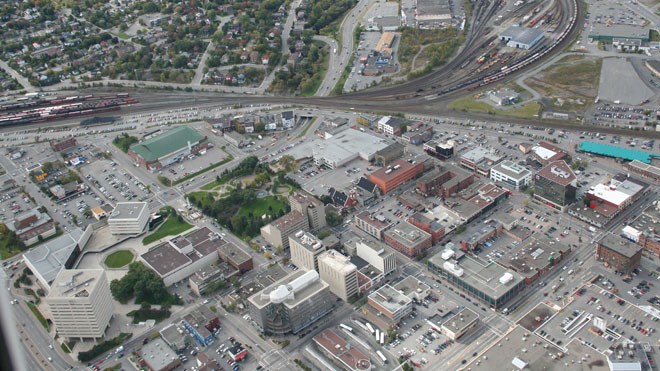The highly publicized infighting on city council has sparked a debate on whether Greater Sudbury's 12-ward, first-past-the-post system needs to change.
In a letter to Northern Life, and in a post on his blog, Sudburian Scott Brooks argued the current system is doomed to fail because it encourages councillors to put the needs of people in their wards first, rather than those of the whole city.
He said a system where six councillors are elected by voters in six city wards, while six councillors are elected by all voters, would help strike a balance between the need to address local concerns and broader, city-wide issues.
“I'm not saying (current problems are) the fault of the people we have,” Brooks said. “Maybe it's just the way we expect them to make decisions. We get wrapped up in tiny little things, and we miss the big picture.”
Before amalgamation in 2001, the city had two levels of municipal government. Local governments focused on smaller issues, while regional government focused on bigger issues. Regional government, for example, helped make Science North a reality in the 1970s, he said.
“I'm old enough to remember walking through Science North when it was first built,” Brooks said. “I don't think it would have happened under the current structure.”
The first city council after amalgamation had six wards, with two councillors per ward. In an attempt to end the competition between the two, and to address concerns about alienation in the former municipalities, council decided to go to the 12-ward system in 2006.
Ward 5 Coun. Ron Dupuis, who was part of that decision, said the current structure has its faults, but deserves more time to see if it can be effective.
“There's no doubt that people elected in a ward system tend to do whatever they can for the people who voted for them,” Dupuis said. “The parochialism does come in, there's no doubt about it.”
But moving to an at-large system means that residents from one part of the city could end up dominating city council, he said.
“Can you imagine if we had the majority of our councillors elected from one area of the city?” he said.
But he said he's unhappy with this term of council, in particular their inability to agree on a broader vision for the city.
“I look back at this term so far, and I'm disappointed,” he said. “There are major issues we could have tackled.”
He said the lack of experience in municipal government hampered former Mayor John Rodriguez and current Mayor Marianne Matichuk. Rodriguez, a former NDP MP, was elected in 2006 and failed to push through his $100-million 'legacy projects' – a new arts centre and convention centre, as well as a multi-use recreation facility.
Matichuk, a first-time politician, was elected in 2010 on such promises as a salary freeze and introducing recall legislation. But she's received little support and has had high-profile battles with council.
Dupuis said their lack of experience hampered them.
“You've got to know how to work with people,” Dupuis said. “You need to sit down with council and explain what your objectives are.”
Rodriguez wanted all or nothing, Dupuis said, and wouldn't compromise.
“Mayor Rodriguez did not want to split up any of the projects — he wanted to make sure (we) got everything or we got nothing,” Dupuis said. “When you do that, you make it a little more difficult for all of council to agree on the big picture. So those projects were not handled properly.”
Laurentian University Prof. Bob Segsworth, who worked on the reforms that led to the new ward structure in 2006, said name recognition is still the biggest single factor in municipal elections. For example, in three open races in 2010, two were won by former mayors — Dave Kilgour in Ward 7 and Terry Kett in Ward 11.
And the lone new councillor, Fabio Belli in Ward 8, ran against opponents who had never sat on city council.
“It's the No. 1 factor in terms of predicting who's going to win and who's going to lose, in municipal politics in particular.”
Join Sudbury.com+
- Messages
- Post a Listing
- Your Listings
- Your Profile
- Your Subscriptions
- Your Likes
- Your Business
- Support Local News
- Payment History
Sudbury.com+ members
Already a +member?
Not a +member?
Sign up for a Sudbury.com+ account for instant access to upcoming contests, local offers, auctions and so much more.
